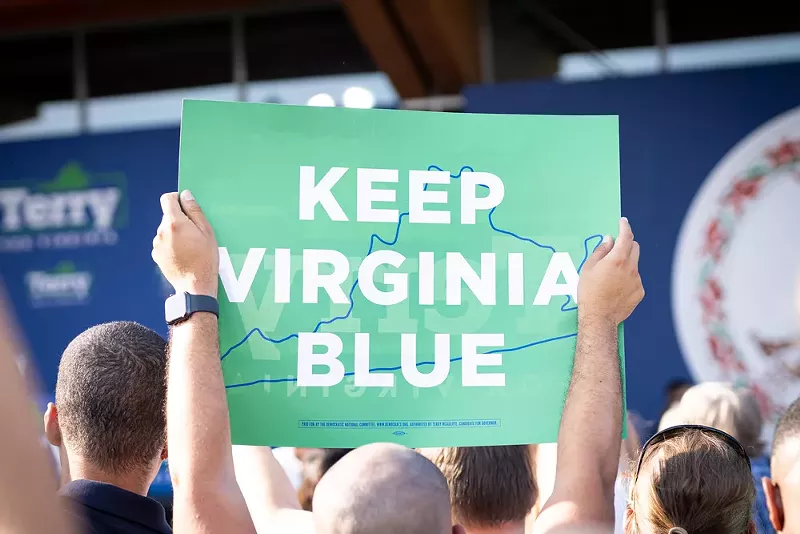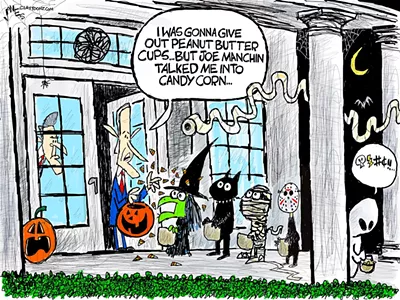After the Virginia loss, Dems are almost certain to take a bad situation and make it worse

Audio By Carbonatix
[
{
"name": "GPT - Leaderboard - Inline - Content",
"component": "35519556",
"insertPoint": "5th",
"startingPoint": "3",
"requiredCountToDisplay": "3",
"maxInsertions": 100,
"adList": [
{
"adPreset": "LeaderboardInline"
}
]
}
]

The worst thing about Terry McAuliffe’s loss wasn’t the fusillade of journalists churning out pre-writes of Democrats’ midterm obituaries, or the schizophrenic New York Times editorial that accused the party of going too far left while simultaneously endorsing its policy goals, or even the fact that Republicans now have evidence that going full knuckle-dragger on COVID and critical race theory turns out their voters no less than Build the Wall did in 2016.
It’s that Democrats, being Democrats, have a pathological ability to learn the wrong lesson from their defeats, which means they’re almost certain to take a bad situation and make it worse by trying to fix it in all the wrong ways. It took all of four days, in fact, for House Dems to decouple the infrastructure and reconciliation bills after binding them for months; now progressives are at the mercy of Democratic moderates who feel vindicated by last week’s results.
Sigh.
There are, of course, lessons to be learned from the Virginia debacle (and the close call in New Jersey). One is that Democrats need a better messaging strategy — any messaging strategy, really. The second? Shit happens, so make hay while the sun shines.
But the wrong lesson, by which I mean the one they’ll take to heart, is that voters are very concerned about Big Government, so they should slow things down.
But paid family leave, lower Medicare drug prices, expanded Affordable Care Act subsidies, child tax credits, universal pre-K, and investing in sustainable energy all poll through the stratosphere. So does taxing billionaires and corporations.
The truth is that Virginians didn’t vote against McAuliffe because they despise child tax credits. As much as we delude ourselves, politics become more and more detached from policy every year. Virginia’s dark-red counties wouldn’t have voted differently if the reconciliation bill began its legislative journey at half the price tag. Politics, especially but not exclusively at the base level, is a demonstration of cultural values — a reflection of how we see ourselves.
After Trump’s election, Democrats showed up en masse, motivated by the threats Trump posed to democratic norms, human rights, and our Twitter feeds. Now it’s the Republican base’s turn. They, too, see themselves as defending their values against forces reordering the world they know — threats real, imagined, and exaggerated: pandemic mandates, cancel culture, critical race theory, the “stolen” election, Black Lives Matter, LGBTQ books in school libraries, etc. There’s not much Democrats can do to curb their enthusiasm, particularly when Dems are in power and become the focus for grievances.
The bigger problem for Democrats is that they gave back anti-Trump swing voters Joe Biden won last year. The Biden coalition relied on swaying moderate, educated white suburbanites along with juicing turnout from the party’s base of urban liberals and people of color, while scraping together just enough rural voters to win Rust Belt states.
In Virginia, swing voters broke hard against the party in power. Put simply, they weren’t happy with the status quo. There are several obvious explanations: The economy languished in the third quarter as COVID’s delta wave wreaked havoc; ironically, the data show that Biden paid a political price for Republicans’ refusal to get a vaccine. Beginning with the botched Afghanistan withdrawal, the months preceding the election offered a string of hits on Biden’s competence; Congress’ inability to get his signature legislation across the finish line didn’t help.
But the Republicans also campaigned on issues that resonated, including the notion — decoupled from reality, but effective regardless — that schools are teaching white kids that they’re bad people. As CRT was redefined to include anything involving diversity, equity, and inclusion — or whatever made white people feel weird — the astroturf outrage at school board meetings across the country convinced a lot of white parents that something untoward was happening. No parent wants their child to be demonized in school; if you’re told often enough that an accurate, contextual rendering of American history demonizes your child, you’re liable to believe it.
Democrats never had an answer. They also didn’t know how to campaign on what they’d accomplished with the power voters had given them: 220 million vaccines delivered and 5 million jobs added to the economy in less than 10 months, yet fewer than a third of voters think the country is on the right track.
Instead, McAuliffe campaigned against the ghost of Donald Trump, trying to drive up turnout in Northern Virginia. But he ignored rural Virginia and paid dearly for it. (The first rule of politics: People won’t vote for you if you don’t ask them to.)
But as much as pundits like to analyze these tea leaves and ascribe blame for losses, the reality of American politics is that parties that hold the White House lose races. Since 1934, the president’s party has gained House seats in the midterms only three times, all under special circumstances: the Great Depression (1934), Bill Clinton’s impeachment (1998), and post 9/11 (2002). In other words, Democrats should assume that the midterms will be brutal, and there’s nothing they can do about it.
So rather than “moving to the center” in the name of unlikely self-preservation, they’d be better served by locking in as much as they can before Republicans reclaim the majority and halt progress on climate change, health care, and wealth inequality. Then spend the next two years bragging about what you accomplished (and Republicans didn’t) in every corner of the country. Do that, and if the economy is still growing, you’ll win in 2024.
But if Democrats learn the wrong lesson from last week — the lesson the Beltway media thinks they should — and the party’s moderates block or further water down the reconciliation package after getting their way on the infrastructure deal, what story will Democrats have to tell?
Get more Informed Dissent at billman.substack.com.
Stay connected with Detroit Metro Times. Subscribe to our newsletters, and follow us on Google News, Apple News, Twitter, Facebook, Instagram, or Reddit.






